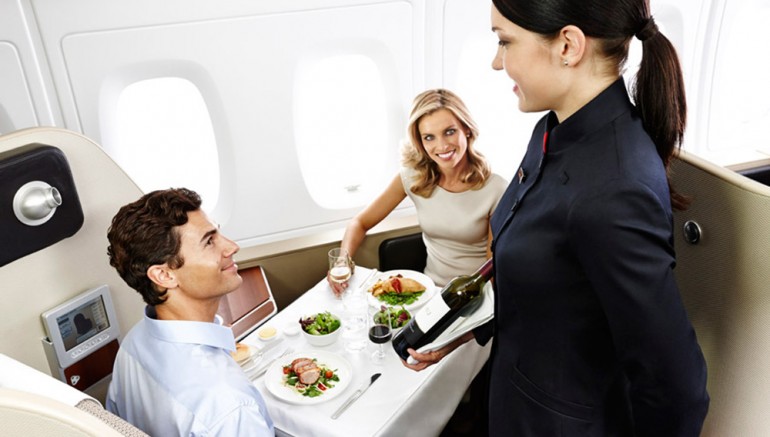Spending a bit more can turn your flight into a profit center
The first-class cabin at the front of the plane may be just a few yards from your economy seat, but it might as well be in a different world. While you’re trying not to bash your knees on the tray table, to eat plastic food, and to get to sleep with a couple of tightly-packed strangers, on many international flight those at the front are lying on a bed in a private cabin, having just enjoyed a dinner prepared by a chef. Served on real china. Of course, they’ll have paid a fortune for those luxuries. A first class ticket from Singapore to New York on Singapore Airlines can set you back around $15,000. Along with the bed, you also get a dining table behind your private sliding doors, a 23-inch entertainment system, and a proper wine list.
But a touch of luxury isn’t all you get when you cash in your air miles, dig deep into your travel budget, or demand the client upgrade your ticket. When you stay in economy, you miss out on three other benefits that are way more valuable than a better class of reheated meal.
1. Time and Energy
First-class passengers arrive at the same time as everyone else. You’ll get off the plane first, but that will only save you a few minutes. The hours it can save you are in the recovery from the flight. David Liu, founder of TheKnot.com, described in The New York Times how, in the early days of his business, a venture capitalist he met was shocked to learn he had saved money by booking a red-eye with three layovers. Instead of being impressed by his thrift, she told him the company couldn’t afford a stressed-out CEO, and booked him on a first-class flight home.
If you’re flying economy class long-distance, your next day or two are going to be a washout. You have to factor in the cost of lost productivity and maybe even a lost deal, if you roll off the red-eye and into a presentation. Bear all those expenses in mind and that economy class seat doesn’t look so cheap anymore.
2. Networking
The first-class areas are the ultimate networking rooms. It starts in the lounge, where you get a proper place to relax, alongside people who are at the top of their professions. It continues on the plane, where you might find yourself sitting alongside the founder of a multimillion-dollar company or the chief executive of a Fortune 500 business. That’s valuable. Last year, Chinese gaming company Da Lian Zeus Entertainment paid $2.35 million to have lunch with Warren Buffett. You’ll pay a lot less to spend several hours sitting next to someone guaranteed to be a success in his or her field.
Those networking benefits are worth grabbing even on domestic flights. The comfort levels might not be much higher, but for a little more money, you’ll get to chat and exchange contact details with people at the top of their professions. If you want to meet and chat with people who have deep pockets and plenty of knowledge, you have to sit at the front of the plane.
3. Work
If you’ve ever tried to work in an economy-class seat, you’ll know it’s almost impossible. There’s barely enough room for your lap, let alone your laptop. A first-class seat is a real office, complete with power outlets, privacy, and Wi-Fi. While you’re squinting at a movie on a small screen in the back of the plane, the people at the front have a chance to pull even further ahead.
So should you be splashing out on a first-class plane ticket next time you travel? If you’re traveling for business and can afford it, it’s worth it.
More for your entrepreneurship 7 Key Habits, Practices, and Experiences








